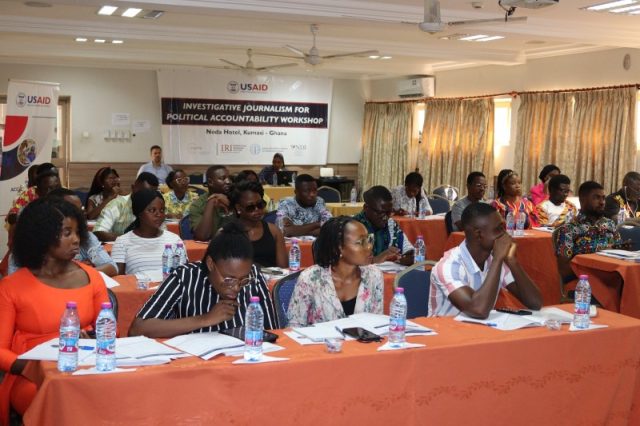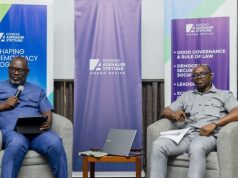By Maltiti Sayida Sadick
The International Republican Institute(IRI) with funding from USAID and partnering with Ghana Journalists Association has trained over 30 journalists from across Ghana in investigative journalism, the RTI and media law for two days in Kumasi.
This training was aimed at equipping the media personnel with tools required to probe issues that border on development and political stability, with an overall focus on exposing corruption and serving the interest of the public i.e holding leaders accountable.
Lawyer William Nyarko a veteran investigative journalist, legal practitioner and Executive Director Africa Center for Accountability, who took the journalists through the concepts of investigative journalism, exposing corruption in political campaigns and in governance speaking to the media said the field of investigative journalism must be supported to thrive to enable journalists whom the constitution has given power, to expose through storytelling the abuse of power and state resources for accountability.
Lawyer Zakaria Tanko Musah Lecturer at the Ghana Institute of Journalism and a member of the RTI Commission, who took the journalists through understanding acquisition of information using the RTI Law and data in research for investigative journalism reports called on Media house owners and News heads to invest in investigative journalism as it tends to be expensive and time-consuming but also gives media houses credibility.
He added that when media houses use the RTI law to access information prevent themselves from acting contrary to the law in search for information for news reports.

Alao Sunday Afolabi Resident Program Director for the International Republican Institute (IRI) in his speech said IRI had seen the need to train more journalists in the area of investigative journalism due to its immense impact on society when some of the issues are brought to light, he said as Ghana heads into an election in December there is the tendency for aspirants of political parties to illegally use public funds and resources for campaign and to misinform the public, and it places a responsibility on journalists to set the records straight with their news stories.

The Ghana Journalists Association which was in charge of bringing together the trainees from the sixteen regions of Ghana ably represented by the Public Affairs
Officer, Rebecca Ekpe told the media that such training on equipping members with skills to improve on their craft as journalists goes to improve information dissemination to the public and guide them on the legal ways of seeking information which is a major barrier in a journalist’s line of activities when putting an investigative piece together.














